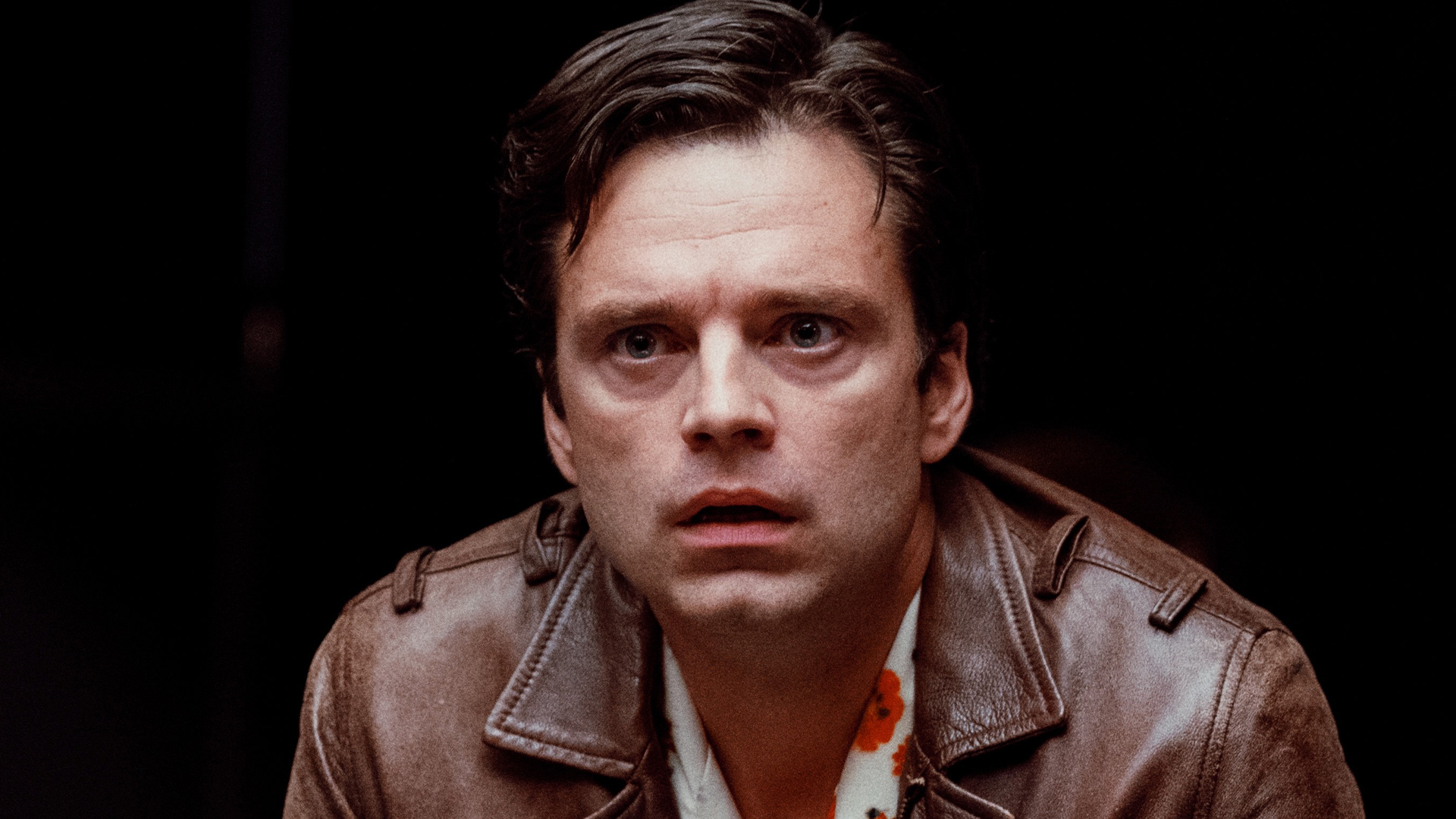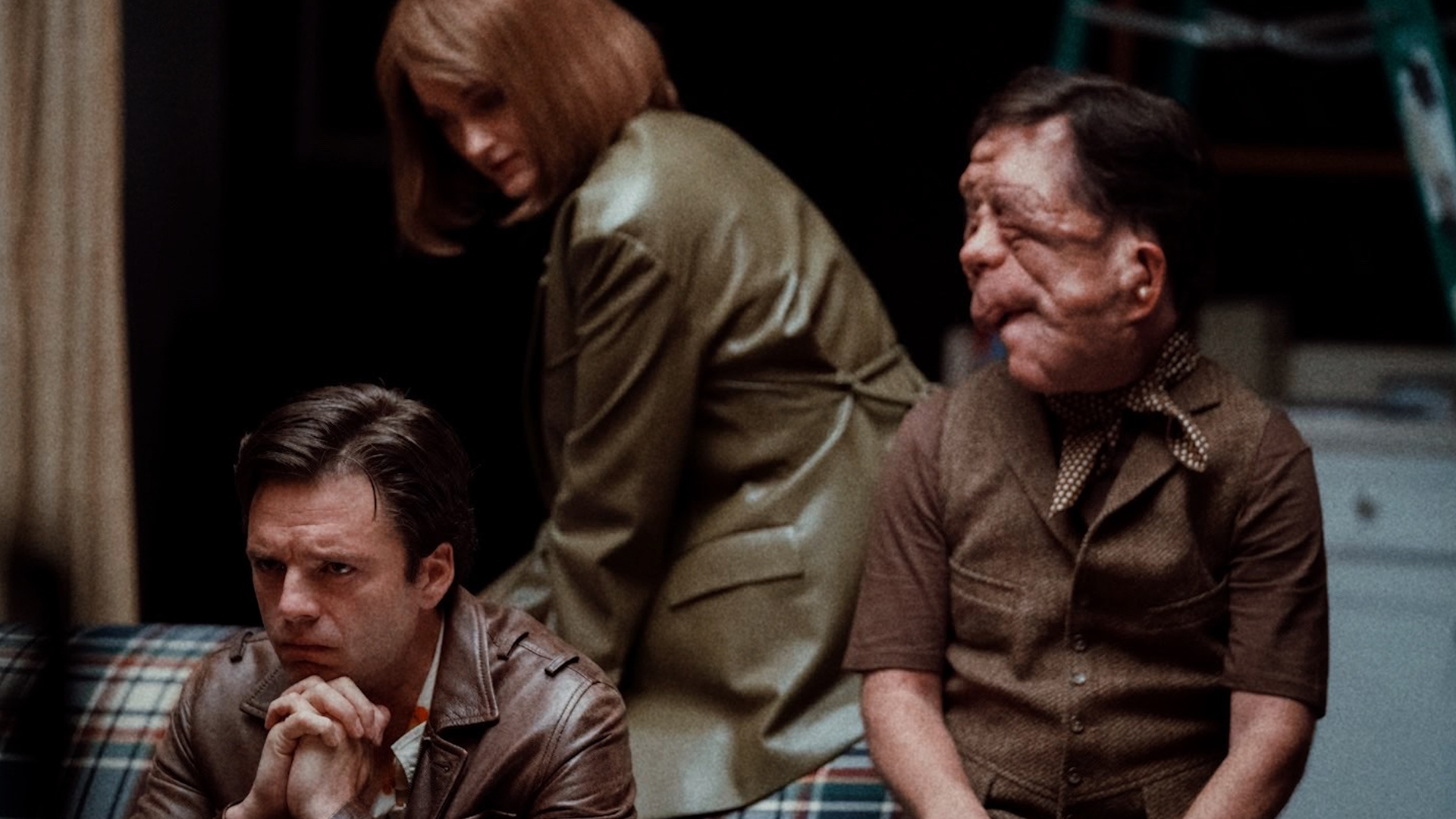Playful and cynical, A Different Man is a provocative comedy of masks and faces
Sebastian Stan, Renate Reinsve and Adam Pearson star in a film festival highlight posing big questions.

Sebastian Stan, Renate Reinsve and Adam Pearson star in A Different Man, a film festival highlight posing big questions about performance and adaptation. The film immediately snagged Eliza Janssen’s interest upon its announcement in this year’s MIFF lineup – and delivers.
Beauty really is skin deep in Aaron Schimberg’s festival fave A Different Man. Concerned with shallowness and performance itself, it’s a black comedy rich with complicated characters, bold shifts in story that’ll keep viewers guessing, and above all a compelling challenge to the masks we all wear.
For Sebastian Stan’s main character Edward, the near-magical transformation of his skin—the Faustian sacrifice of a pound or so of flesh—changes everything. The MCU actor is unrecognisable at first under sagging facial prosthetics, his blandly handsome looks disguised by the protagonist’s neurofibromatosis. When a miraculous medical treatment causes his disfigurement to fall away practically overnight, he kills off his old self and lustily takes up a life of superficial pleasures.
Before Edward’s retired by Guy, he’s delivered a possible thesis statement for the entire film; a neighbour cheerily intones that “all unhappiness in life comes from not accepting what is.” But is that all Schimberg’s driving at here—mind over matter, love yourself, pastel-coloured Instagram infographic-type sentiment? I don’t believe so. What lies beneath A Different Man’s entertaining facade is a harder truth to swallow, elaborating on the consequences of a failure in self-acceptance: that our experiences, even our suffering, might amount to nothing when we reject the fragile shell of how we see ourselves.
With its melodramatic score and big questions about performance and adaptation, A Different Man immediately snagged my interest as a masculine double to May December, Todd Haynes’ terrific drama about the impossibility of capturing the lives of others through art. Edward is a struggling actor, only finding work in cringe-inducing workplace educational videos and reciting telling lines of Cyrano de Bergerac in unwelcoming auditions. Restyling himself as real-estate agent Guy (what name could be more generic, more desiring of normalcy?), Stan’s metamorphosed character is still an actor, but his stage is now public life: he yearns to seamlessly fit in, to go unnoticed. In an early diner scene with his neighbour Ingrid (Renate Reinsve), Edward is seated in front of a huge window as he picks at his meal, Schimberg catching every single pedestrian’s rude glances at him when they pass by. Guy clearly relishes his shot at escaping this zoo.
Reinsve wasn’t actually The Worst Person In The World in her 2021 breakout role, but man does she suck here. A beautiful and blithely manipulative playwright, she doesn’t recognise Guy when he auditions for her off-Broadway show, which reimagines Edward’s life and death as a self-serving fable of unrequited love through an able-bodied lens. She rightfully wonders whether it’d be exploitative to cast a disfigured person as her version of Edward regardless of their talent, but it’s plainly an excuse to work Guy into the production—and to hook up with him, failing to recognise his voice or demeanour as that of her supposed muse. In bed together, she asks him to wear a 3D-printed mask of her dead neighbour’s face—but can’t even commit to any fetishistic transgression, bursting into laughter as he draws close. In the narrow way that Ingrid sees herself, the idea of her sleeping with Guy dressed as his previous state is “so fucked up”, and we feel the psychic damage this would do to the undercover Edward.
Until the halfway point of Schimberg’s story, we’re stuck with these two fascinating airheads, each empty of real artistic inspiration or purpose: one suddenly made conventionally attractive, the other hilariously ugly on the inside. Everything explodes when another person with neurofibromatosis almost literally enters from stage left—Under The Skin standout and disability activist Adam Pearson, who gets an ostentatious “and Adam Pearson as Oswald” credit in the film’s title cards. He’s undeniably a better choice to play Ingrid’s Edward than Guy, who has become a Ship of Theseus, all his soulful and specific qualities surgically excised. Then again, did Edward have specific, admirable qualities in the first place? Or have we merely projected them onto him through our pity?
After feeling Edward’s alienation so strongly in act one, you might end up begging him to let the whole face thing go: everyone else has, and isn’t that what he wanted anyways? We’ve gradually come to relate to Stan’s obfuscating prosthetics, seeing them as familiar, recognisable; at the very least his otherness invokes deep sympathy that is perhaps wrong and patronising in its own right. In a clever reversal, his Hollywood handsomeness now feels more foreign to us, flaunting the kind of good looks viewers might even resent. Hell, I myself had wrongly written off Stan as an unmemorable B-list hunk.

Schimberg darkly suggests that through an understandable grab at a new, normal existence, the pain of the life Guy’s left behind has amounted to nothing. His abandoned self is up for the taking, and Oswald is the deserving understudy waiting in the wings. Where Edward stooped in dowdy flannels and preferred not to speak, Oswald dresses and speaks flamboyantly, crowing about his many talents and infuriatingly being a lovely guy to boot. To an almost fantastical degree, Oswald floats above the noxious judgement Edward once faced, driving Guy to madness with the inappropriate stares and comments his usurper doesn’t experience.
There’s something so metatextually wicked happening here with Pearson’s casting, after his appearance in Schimberg’s previous feature Chained For Life. The actor charmingly chews scenery in a role that circumvents his facial difference so much as to feel comedic, barely dwelling on his “unique physiognomy” and appearing genuinely hyped for Ingrid’s problematic work about his very condition. You can sense Schimberg and his returning star giggling through the role: an antagonist to our embattled “hero” who poses a threat by winning the movie’s sick game of faces and masks, through his sheer delightfulness. It feels like an OTT provocation regarding calls—some from Pearson himself—to cast disabled actors in parts that don’t reference their differences to the average performer.
Like A Different Man itself, Oswald isn’t deeply engaged with questions of representation, of whether it’s politically correct for the play’s Edward to get distastefully murdered in act three. The tacky play-within-a-film playfully points out the absurdity of such a trope, in which othered characters must die for the self-actualisation of conventionally attractive heroes. The film, too, indulges in a wild, drawn-out third act that spirals across time and Guy’s inevitable mental breakdown, halting for a comic cameo from an acting legend.
Despite explicit references to Cyrano and the moral questionability of The Beauty and the Beast—romantic, simplistic stories about how life is easier for pretty normies—A Different Man gradually signals that it’s aiming for something entirely, well, different. Schimberg’s New York is an obnoxious, aggressive realm not entirely unlike the hostile urban scenes in Ari Aster’s Beau Is Afraid, with objects constantly plummeting down around Edward’s head and an abrasive soundscape of noisy interruptions.
Wherever you go, Edward/Guy learns, there you are; and any masks you take pains to construct must fall away at some point, like drowned rats from that ignored hole in the ceiling. A mask is a flimsy mechanism, ripped from your face when confronted with the real thing.
THIS REVIEW WAS ORIGINALLY PUBLISHED 19 AUGUST 2024

























